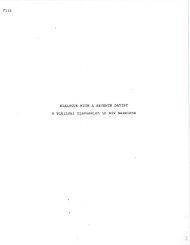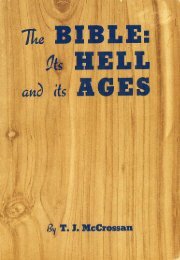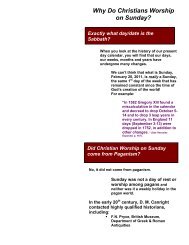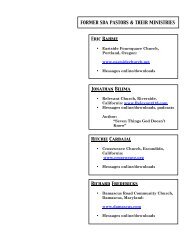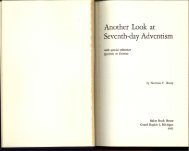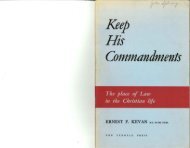Discovering the New Covenant by Greg Taylor - exAdventist Outreach
Discovering the New Covenant by Greg Taylor - exAdventist Outreach
Discovering the New Covenant by Greg Taylor - exAdventist Outreach
Create successful ePaper yourself
Turn your PDF publications into a flip-book with our unique Google optimized e-Paper software.
THE SABBATH IN COLOSSIANS<br />
be to get things out of order. The <strong>New</strong> Testament was<br />
written to give us a more full revelation of God’s workings<br />
in human history. It gives us <strong>the</strong> fullest revelation of all,<br />
Jesus Christ. Since we must apply <strong>the</strong> message of Jesus to<br />
our personal lives as post-Cross Christians, <strong>the</strong> Epistles were<br />
written specifically for that purpose. Jesus came to fulfill<br />
much of <strong>the</strong> system of Judaism, for example. He came to<br />
fulfill some of <strong>the</strong> aspects of <strong>the</strong> Old <strong>Covenant</strong> or Testament.<br />
How do we know which ones? The Gospels do not spell out<br />
which ones. The Epistles do that. So it is of crucial<br />
importance that we remember <strong>the</strong> application principles<br />
when studying <strong>the</strong> Scriptures.<br />
I went first to <strong>the</strong> <strong>New</strong> Testament (covenant or will) and<br />
specifically to <strong>the</strong> Epistles to see what is taught <strong>the</strong>re about<br />
<strong>the</strong> application of <strong>the</strong> Sabbath to Christians today. Then I<br />
went to Jesus’ life to see if He made room for such an<br />
interpretation in His life and ministry. I asked myself if<br />
Jesus’ life and ministry prepared <strong>the</strong> way for what I had<br />
learned in <strong>the</strong> Epistles. Finally, I went back to <strong>the</strong> Old<br />
Testament to see if what is written <strong>the</strong>re agrees with <strong>the</strong><br />
Epistles and Jesus on <strong>the</strong> subject. In this way, I made every<br />
effort to focus on <strong>the</strong> application sections of <strong>the</strong> Scriptures<br />
first.<br />
The first text I studied is found in Colossians two. (I am<br />
using <strong>the</strong> <strong>New</strong> King James version of <strong>the</strong> Bible unless<br />
o<strong>the</strong>rwise indicated, and all of <strong>the</strong> emphases are my own.) In<br />
<strong>the</strong> book of Colossians, Paul is addressing a syncretistic<br />
heresy that is a mixture of angel worship and ascetic<br />
practices. But mixed into it all is <strong>the</strong> Judaizing element<br />
(Jewish legalistic Christians who were requiring Jewish law<br />
of <strong>the</strong> Gentile believers) that is trying to influence <strong>the</strong>se new<br />
Christians. In <strong>the</strong> Colossians two passage, <strong>the</strong> focus is on <strong>the</strong><br />
Jewish part of <strong>the</strong> heresy. Starting with verse 11, Paul<br />
focuses on <strong>the</strong> fact that circumcision has been replaced <strong>by</strong><br />
baptism; <strong>the</strong>refore circumcision is no longer required. Then<br />
he points out that <strong>the</strong> record of our sins is nailed to <strong>the</strong> Cross<br />
67



